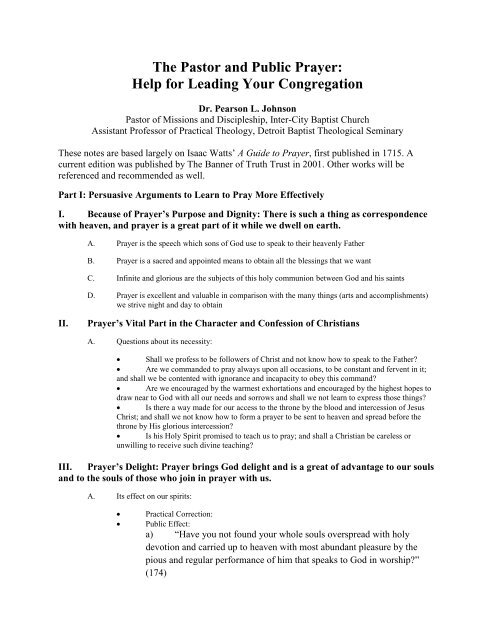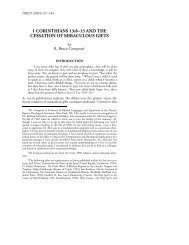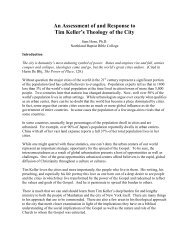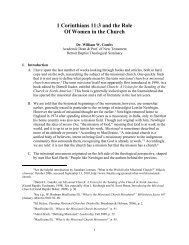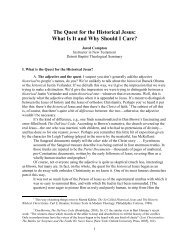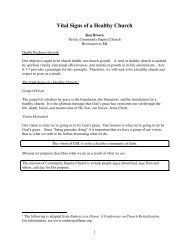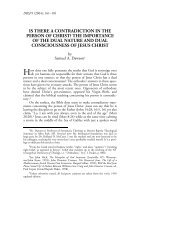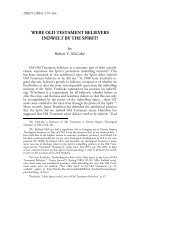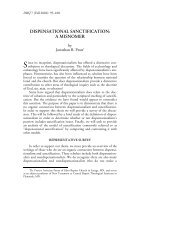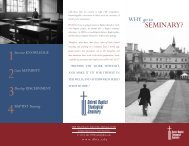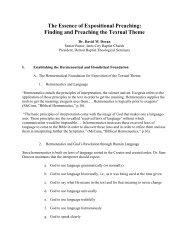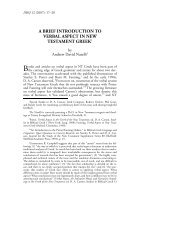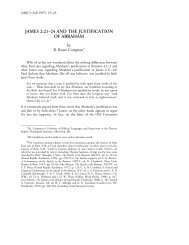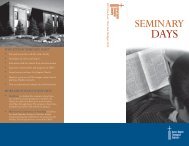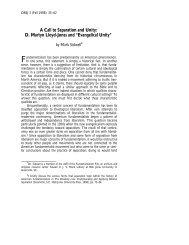notes - Detroit Baptist Theological Seminary
notes - Detroit Baptist Theological Seminary
notes - Detroit Baptist Theological Seminary
You also want an ePaper? Increase the reach of your titles
YUMPU automatically turns print PDFs into web optimized ePapers that Google loves.
The Pastor and Public Prayer:<br />
Help for Leading Your Congregation<br />
Dr. Pearson L. Johnson<br />
Pastor of Missions and Discipleship, Inter-City <strong>Baptist</strong> Church<br />
Assistant Professor of Practical Theology, <strong>Detroit</strong> <strong>Baptist</strong> <strong>Theological</strong> <strong>Seminary</strong><br />
These <strong>notes</strong> are based largely on Isaac Watts’ A Guide to Prayer, first published in 1715. A<br />
current edition was published by The Banner of Truth Trust in 2001. Other works will be<br />
referenced and recommended as well.<br />
Part I: Persuasive Arguments to Learn to Pray More Effectively<br />
I. Because of Prayer’s Purpose and Dignity: There is such a thing as correspondence<br />
with heaven, and prayer is a great part of it while we dwell on earth.<br />
A. Prayer is the speech which sons of God use to speak to their heavenly Father<br />
B. Prayer is a sacred and appointed means to obtain all the blessings that we want<br />
C. Infinite and glorious are the subjects of this holy communion between God and his saints<br />
D. Prayer is excellent and valuable in comparison with the many things (arts and accomplishments)<br />
we strive night and day to obtain<br />
II.<br />
Prayer’s Vital Part in the Character and Confession of Christians<br />
A. Questions about its necessity:<br />
Shall we profess to be followers of Christ and not know how to speak to the Father<br />
Are we commanded to pray always upon all occasions, to be constant and fervent in it;<br />
and shall we be contented with ignorance and incapacity to obey this command<br />
Are we encouraged by the warmest exhortations and encouraged by the highest hopes to<br />
draw near to God with all our needs and sorrows and shall we not learn to express those things<br />
Is there a way made for our access to the throne by the blood and intercession of Jesus<br />
Christ; and shall we not know how to form a prayer to be sent to heaven and spread before the<br />
throne by His glorious intercession<br />
Is his Holy Spirit promised to teach us to pray; and shall a Christian be careless or<br />
unwilling to receive such divine teaching<br />
III. Prayer’s Delight: Prayer brings God delight and is a great of advantage to our souls<br />
and to the souls of those who join in prayer with us.<br />
A. Its effect on our spirits:<br />
<br />
<br />
Practical Correction:<br />
Public Effect:<br />
a) “Have you not found your whole souls overspread with holy<br />
devotion and carried up to heaven with most abundant pleasure by the<br />
pious and regular performance of him that speaks to God in worship”<br />
(174)
) “What divine impressions of holiness have you felt in public<br />
worship in the congregation when this duty has been performed with holy<br />
skill and fervency, and in that prayer you have received more solid<br />
edification than from the whole sermon”(174). Thus a good attainment of<br />
this gift is made a fitting instrument of sanctification as well as comfort,<br />
by the co-working power of the blessed Spirit” (175).<br />
c) “But on the other hand, has not your painful experience sometimes<br />
taught you that zeal and devotion has been cooled and almost quenched by<br />
the vain repetitions or weak and wandering thoughts of some fellow<br />
Christian that leads the worship” (175)<br />
<br />
Personal Encouragement:<br />
a) “How sweet refreshment have you found under inward burdens of<br />
mind or outward afflictions, when in broken language you have told them<br />
to your minister and he has spread them before God in such words as have<br />
expressed your whole souls and your sorrows And you have experienced<br />
a sweet serenity and calmness of spirits” (174).<br />
IV. Prayer’s Pursuit: The Honor of God and the reputation of religion in the world is<br />
affected by prayer.<br />
A. God deserves our best in prayer as in other areas of life and worship<br />
“The great God esteems himself dishonored when we do not pay him the<br />
best worship we are capable of . . . to neglect utterly this gift of prayer, to serve<br />
him daily with a few sudden thoughts with rude and improper expressions that<br />
never cost us anything but the labour of our lips, is not the way to sanctify his<br />
name among men” (175-176).<br />
“Sinful sloth and indifference in religion have tempted some men to<br />
believe that God is not an interested and exact inquirer into outward things. And if<br />
they can persuade themselves their intentions are right, they imagine that for the<br />
substance and form of their sacrifice anything will serve. And as though he were<br />
not a God of order, they address him often in confusion. Because the heart is the<br />
chief thing in divine worship, like some foolish Israelite, they are unconcerned<br />
what beast they offer him, so long as it has a heart.”(176)<br />
The prophet Malachi thunders with divine indignation and jealousy<br />
against such worshippers: ‘Ye have brought that which was torn, and the lame,<br />
and the sick; should I accept this of your hand I am a great King, saith the Lord<br />
of hosts, and my name is dreadful (Mal 1:13-14)”
B. The World needs to hear excellent prayer<br />
“When an unskillful person speaks in prayer with a heaviness and<br />
barrenness of thought, with low and improper language, with a false and offensive<br />
tone of voice, or when he accompanies his words with awkward gestures, what<br />
slanders are thrown upon our practice!” (178)<br />
V. Prayer’s Simplicity: It is easy to attain a life of prayer with the common assistance<br />
of the Holy Spirit, but it is not to be acquired without some pains and diligence.<br />
A. It will take patience and effort to pray effectively:<br />
B. It takes planning<br />
C. An objection to written prayers:<br />
<br />
They can quench the spirit and not be spontaneous.<br />
Answer: So long as we do not regard the written prayers as the end, but<br />
only as a means to help us to pray, and if we give ourselves liberty in their use, we<br />
are not quenching the Spirit.<br />
VI.<br />
Prayer’s Neglect: There are ill consequences for prayer’s neglect.<br />
A. You will drag on heavily in the work of prayer all your days<br />
“…even in your private rooms and with your family, and you will be<br />
liable to so many imperfections in the performance that it will rob your soul of a<br />
great part of the benefit and the delight of this sweet duty and give neither<br />
pleasure nor profit to those who hear you.” (184)<br />
“The ignorant part of your household will sleep under you, while the more<br />
knowing will be in pain for you” (184)<br />
B. You will give yourself up to a morning or evening form and rest in them from year to year<br />
C. If you have been brought up with a hatred of forms of prayer, and yet don’t know how to pray<br />
without them, you will grow first inconstant in this duty, with every little hindrance diverting you;<br />
and at last perhaps you will leave it off entirely, and your house . . . will be without prayer<br />
“Parents, which of these evils do you choose for your children . . .you<br />
scarcely give them any regular instructions on how to perform this duty. . . But<br />
whatever ill consequences attend them hereafter, consider what share of the guilt<br />
will lie at the door of those who never took any pains to show them how to pray.”<br />
(185)
Part II: A Guide to Purposely Forming Pulpit Prayers<br />
Some helpful forms:<br />
1. P.R.A.Y.: (David Doran, Inter-City <strong>Baptist</strong> Church)<br />
a. Praise<br />
b. Repent<br />
c. Ask<br />
d. Yield<br />
2. Directional (Daniel Henderson, “How to Lead Life-Giving Prayer Experiences”)<br />
a. Upward- reverence<br />
b. Downward- response<br />
c. Inward- resources and relationships<br />
d. Outward- readiness for battle<br />
3. A Method for Prayer: (Matthew Henry)<br />
a. Address to God<br />
b. Confession of Sin<br />
c. Petition and Supplication for Ourselves<br />
d. Thanksgivings<br />
e. Intercession and Supplication for Others<br />
f. Address to God on Particular Occasions<br />
g. Conclusion<br />
A Highly Recommended Model: A Guide to Prayer: (Isaac Watts: 9 parts)<br />
I. Invocation: calling upon God.<br />
A. The mention of one or more of the names or titles of God<br />
B. The declaration of our desire and design to worship Him<br />
C. The expression of our desire of His assistance and acceptance
II.<br />
Adoration: honor paid to God by the creature.<br />
A. A mention of His nature as God with the highest admiration and reverence.<br />
B. The mention of His many attributes.<br />
C. The mention of His many works of creation, of providence and of grace<br />
D. The mention of His relation to us<br />
1. As Creator, Father, Redeemer, King, Friend, our Everlasting Portion<br />
2. Mention Christ who has allowed us to relate to God.<br />
3. We should notice a progression in prayer: “When we consider his Nature, we<br />
stand afar off from him as creatures from a god, for he is infinitely superior to<br />
us. When we speak of His attributes a great acquaintance seems to grow<br />
between God and us . . . But when we proceed to mention the many works of<br />
his hands, by which he has tangibly revealed Himself to our understanding,<br />
we seem to approach yet nearer to God. And when at last we can arise to call<br />
him our God, from a sense of his special relation to us in Christ, then we gain<br />
the nearest access and are better prepared for the following parts of this<br />
worship” (13).<br />
III.<br />
Confession<br />
A. A humble confession of the lowliness of our original natures<br />
B. A confession of our since, both original and actual<br />
1. “Sometimes it is convenient and necessary to enter into a more particular<br />
detail of our various faults and follies. We should mourn before God because<br />
of our pride and vanity of mind; the intensity of our passions; our earthlymindedness<br />
and love of this world; our indulgence of our flesh; our carnal<br />
security and unthankfulness under plentiful mercies, and our fretfulness and<br />
impatience, or sinful dejection, in a time of trouble; our neglect of duty and<br />
lack of love to God; our unbelief and hardness of heart; our slothfulness and<br />
decay in religion; the dishonors we have brought to God; and all our failures<br />
towards our fellow creatures” (14)<br />
2. Reflect “on their variety and their number: that we have committed them<br />
against much light and have sinned against much love; and we have<br />
committed these after many rebukes from the Word and providence and many<br />
consolations from the gospel and from the Spirit of God” (15)<br />
C. A confession, arising from our sense of all our aggravated sins, that we deserve punishment and are<br />
unworthy of mercy<br />
D. A confession or humble representation of our wants and sorrow of every kind
IV.<br />
Petition<br />
A. A desire of deliverance from evil<br />
1. From Guilt:<br />
2. From the Power of Sin:<br />
3. From Our Depravity and Appetites:<br />
4. From Temptation:<br />
5. From the World:<br />
6. From Our Just Desert:<br />
7. From Our Enemies, Yea, from Ourselves and Our Folly:<br />
B. A request of good things to be bestowed<br />
1. Sanctification: “The sanctification of our natures by his Holy Spirit . . . for his enlightening<br />
influences to teach us the knowledge of God in Christ Jesus, as well as reveal to us the evil of<br />
sin and our danger by it” (17).<br />
2. Confirmation and Assurance:<br />
3. Transformation:<br />
4. Holiness:<br />
5. Affection:<br />
6. Correction: “let the strokes of thine afflicting hand wean us from sin, mortify us to this world,<br />
and make us ready for departure, whenever thou pleases to call us” (17)<br />
7. Leading:<br />
8. Physical Provision:<br />
i. “But since while we are here we wear these bodies of flesh, and there are many things<br />
necessary to support our live and to make them comfortable, we entreat thee that thou<br />
wouldst bestow these conveniences and refreshments upon us, so far as is consistent with<br />
thine own glory and the designs of thy grace.”<br />
ii. “Let our health, our strength and our peace be maintained, and let holiness to the Lord be<br />
inscribed upon them all, that whatever we receivefrom thine hands may be used to thine<br />
honour and our own truest advantage” (18)<br />
C. These are to be offered up for ourselves and for all saints.<br />
“Intercession” is the common name for this part of our petitions.<br />
1. For the Church in general<br />
2. For the Nation to which we belong<br />
3. For our friends and near relations<br />
4. For our enemies<br />
D. In what manner do we make petitions<br />
1. We may use “importunity” in Watts’ opinion when:<br />
a. We are praying for things necessary for the glory of God<br />
b. When we are praying for things necessary for our salvation<br />
2. We should not have such an attitude when we plead with God for temporal mercies and<br />
comforts
V. Pleading<br />
A. We may plead with God from the greatness of our wants, our dangers or our sorrows for relief.<br />
B. The many perfections of the nature of God provide another kind of argument in prayer:<br />
1. His Mercy & Grace:<br />
2. His Lovingkindness:<br />
3. His Omniscience:<br />
4. His Omnipotence:<br />
5. His Justice:<br />
6. His Sovereignty:<br />
C. Another argument in pleading with God may be drawn from the several relations in which God stands<br />
to men—particularly His own people<br />
1. As Creator:<br />
2. As Father:<br />
D. The promises of salvation<br />
E. The name and honor of God in the world.<br />
F. As has been the experience of ours or others in the past<br />
G. The name and mediation of Jesus Christ-<br />
1. The most powerful and prevailing argument is this one.<br />
2. His Obedience:<br />
3. His Death:<br />
4. His Forsaking:<br />
5. His Intercession:<br />
6. His Blood:<br />
VI.<br />
Profession, or Self-Dedication<br />
A. A profession of our relationship to God<br />
B. A profession of our former transactions with God<br />
1. He is our Good:<br />
2. He is our Hope:<br />
3. He is our Identification:<br />
C. A present surrender of ourselves to God and a profession of the present exercise of our affections and<br />
graces towards him<br />
1. “This is sweet language of prayer when the soul is in a right frame”<br />
2. Having been Justified:<br />
3. Being Sanctified:<br />
4. Determination of our Hope:<br />
5. Determination of our Loyalty:<br />
6. Commitment of our Love:<br />
D. A profession of our humble and holy resolutions to be the Lord’s forever
VII.<br />
Thanksgiving<br />
We should give thanks both for benefits we have and have not prayed for!<br />
A. Those benefits which God has bestowed on us without our asking<br />
1. For making a distinction between us as fallen men and fallen angels<br />
2. Reconciling sinners<br />
3. For the gospel<br />
4. For being born into a land of light<br />
5. For preservations from dangers which we could never foresee nor prevent<br />
6. For not cutting us off in a state of nature and sin<br />
7. For so many conveniences and comforts<br />
B. For benefits we have received as an answer to prayer<br />
VIII.<br />
Blessing<br />
A. Mentioning the many attributes and glories of God with inward joy, satisfaction and pleasure<br />
B. Wishing the glories of God may forever continue, and rejoicing at the assurance of it<br />
IX.<br />
Amen<br />
A. A belief of all that we have said concerning God and ourselves<br />
B. A desire to obtain all that we have prayed for, longing after it and looking for it<br />
C. A confirmation of our professions to God<br />
D. The hope and sure expectation of our acceptance as persons and as audience of our prayers<br />
Part III: Some Pointers and Principles for Public Prayer<br />
I. Make it a real and purposeful part of the worship service, not a transition point.<br />
II.<br />
“Thirteen Tips” From Kevin DeYoung<br />
(http://thegospelcoalition.org/blogs/kevindeyoung/2010/03/19/thirteen-tips-for-leading-thecongregation-in-prayer/)<br />
1. Prepare.<br />
2. Use forms with freedom.<br />
3. Pray Scripture.<br />
4. Don’t footnote.<br />
5. Leave the preaching for the<br />
sermon.<br />
6. Share some details of<br />
congregational life, but not all.<br />
7. Pray so that others can follow you<br />
easily.<br />
8. Keep it relatively brief.<br />
9. Remember you are praying with<br />
and on behalf of others.<br />
10. Order your prayer.<br />
11. Beware of verbal ticks.<br />
12. Show proper reverence,<br />
confidence, and emotion.<br />
13. Pray before you pray.
III.<br />
Some Principles for Public Prayer by J. Ligon Duncan III (following Samuel Miller) from Matthey<br />
Henry, A Method for Prayer. (Christian Heritage, 1994, Appendix 2)<br />
Be aware of the following:<br />
1. Overuse of certain favorite words and set forms of expression.<br />
2. Hesitation and apparent embarrassment in articulation.<br />
3. Ungrammatical expression in prayer.<br />
4. A lack of order and certain important elements of prayer.<br />
5. Too much detail in particular elements of prayer.<br />
6. Praying too long.<br />
7. The employment of allegorical style in prayer.<br />
8. Introduction of allusions to party politics, and personalities in prayer.<br />
9. Usage of unsuitably affectionate or intimate language in prayer.<br />
10. The injection of comedy into prayer.<br />
11. Use of prayer to expound on a point in teaching.<br />
12. Careless over-emphasis of doctrines which are particularly repugnant to unbelievers. .<br />
13. Casualness or over-familiarity in our speech with the almighty.<br />
14. Inappropriate display of pastoral “humility”.<br />
15. Flattery in prayer.<br />
16. Lack of sense of occasion.<br />
17. Lack of reverence in the conclusion of a prayer.<br />
18. Excessive volume and rapidity in prayer.<br />
Some Characteristics of Good Public Prayer:<br />
1. Public prayer should abound in the language of scripture.<br />
2. Public prayer should be well-ordered.<br />
3. It should be general and comprehensive.<br />
4. It should not be too wordy or lengthy.<br />
5. It should be appropriate to the occasion on which it is offered.<br />
6. It ought to contain a good dose of gospel truth.<br />
7. It should manifest variety.<br />
8. If prayer is routinely closed with a doxology from scripture, the doxology should be varied.
9. It should contain petition for the advance of the gospel.<br />
10. The names of the lord should be appropriately employed in the various parts of prayer.<br />
11. It should be marked by the spirit and language of hope and confidence.<br />
12. The prayer after the sermon should be solemn and impressive.<br />
13. The frequent use of the lord’s prayer is proper, but not mandatory.<br />
14. The voice and tone in which we offer prayer should be suitable to the solemn activity.<br />
In conclusion, we may note Miller’s pithy description of an acceptable public prayer. He said<br />
“Words, ‘few’, ‘well considered,’ and ‘well ordered,’ are the inspired characteristics of a good<br />
prayer.”<br />
Part IV: How Can I Apply These Things<br />
1. Purposefully incorporate Scripture into your praying—you will be praying according to God’s<br />
will<br />
a. Consider doing this in conjunction with your sermon preparation<br />
b. Consider doing this in accord with the calendar<br />
2. Focus on the fact that you are leading your congregation in prayer to God<br />
3. Remember the promised help of the Holy Spirit and dedicate yourself to a life-long growth and<br />
development of being devoted to prayer<br />
4. Record your prayers and listen to them or have others listen for repeated phrases or meaningless<br />
fillers.<br />
5. Don’t be over-concerned about what people think about you, but what they think about the God<br />
you lead them in prayer to.<br />
6. Develop a prayer journal or notebook with Watts’ categories of prayer so that when you read your Bible,<br />
you can write down Scriptural language in each category and so form your own prayers. You may fit these<br />
into the P.R.A.Y. acrostic if this is more streamlined for you. Assemble one prayer from the <strong>notes</strong> you have<br />
taken according to Watts’ method, and write it out for use in leading the congregation in prayer for one of<br />
the Sunday services. Start with one per month and increase the frequency from there.<br />
Resources:<br />
Isaac Watts, A Guide to Prayer (Banner of Truth). This is most helpful and is a series of lectures in written form<br />
Watts delivered to a group of aspiring pastors. It presents a model for improving and incorporating Scripture into<br />
both private and public prayer.<br />
Matthew Henry, A Method for Prayer (Christian Heritage). Henry’s work is similar to Watts’. Watts actually<br />
references Henry in his lectures. Henry includes a number of scripture references for each section of his prayer<br />
model.
D.A. Carson, A Call to Spiritual Reformation: Priorities from Paul and His Prayers (Baker). Carson provides a<br />
particularly encouraging study of Paul’s prayers for the aid of a congregation praying more effectively. This would<br />
provide the basis for a good preaching or teaching series on prayer.<br />
John MacArthur, At the Throne of Grace (Harvest House). MacArthur here publishes a number of his pulpit<br />
prayers, formed according to particular texts he preached in conjunction with his prayers. This collection is very<br />
helpful as a model and as a meditation tool.<br />
Paul Miller, A Praying Life: Connecting with God in a Distracting World (NavPress). Miller’s book is helpful for<br />
church members in developing prayer as a discipline in their life.<br />
W. Bingham Hunter, The God Who Hears (IVP). Hunter addresses a number of different questions related to prayer<br />
and gives some very practical pastoral instruction concerning prayer. Very teaching or group-discussion oriented,<br />
with questions at the end of each chapter.<br />
Woodrow Kroll, When God Doesn’t Answer (Baker). Subtitled “removing roadblocks to answered prayer,” Kroll<br />
provides practical teaching for church members wanting to grow in their effectiveness in prayer.


